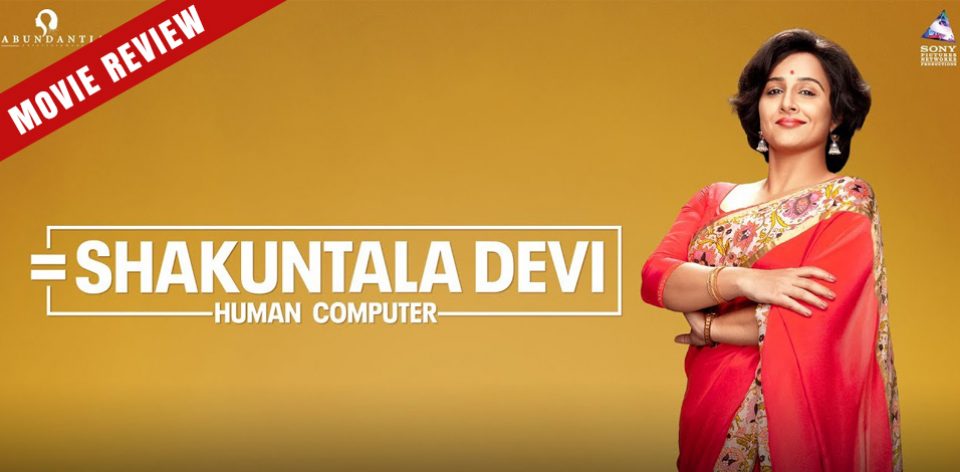Generally, biopics/historic films are more entertaining than other genres. Because they give us a snapshot of an important moment in history that might have eluded us otherwise. From the successful rise of an immigrant musician Farrokh Bulsara to the tragic drowning of the ‘Titanic’, movies have helped us to relive many such moments that would have just been pages in history books if it hadn’t been captured on screen. For this reason, I was excited to watch ‘Shakuntala Devi’, the newest edition of direct-to-digital release films that have gone straight to the Over-The-Top (OTT) platforms.

Directed by Anu Menon & released on 31st July on Amazon Prime, ‘Shakuntala Devi’ follows the life of one of the most extraordinary female mathematicians that lived in India and the struggles she faced in her life. Shakuntala had an unusual talent for calculating complex numbers in a matter of seconds and this talent was discovered by her family at the age of 5. A professional lion-tamer in real life, Shakuntala’s father took her on ‘math shows’ across cities to monetize her ability. Unable to live life on her terms, Shakuntala ran away to London to start afresh and build on her mathematical talent. The film covers her life, her success (including the famous incident after which she was named the ‘human computer’), and her struggle that she faced with her husband and daughter.

Vidya Balan’s performance is the soul of the movie. Her ability to step into the shoes of Shakuntala Devi is marvelous. From a carefree young woman to a controlling mother, Vidya Balan has played the character almost flawlessly. Vidya Balan has been an advocate of women-centric roles in Indian cinema with films such as The Dirty Picture, Kahaani, Tumhari Sulu, etc. and ‘Shakuntala Devi’ just became a part of her prestigious mantle. Besides Vidya Balan, I even liked Sanya Malhotra playing the role of Shakuntala’s daughter Anupama. Sanya’s portrayal of a disgruntled daughter and a troubled individual is very relatable. Complementing both the actors and carrying on his hot streak of performances, it is delightful to see Amit Sadh playing the supporting role of Ajay, Anupama’s husband.

Although the film has powerful performances by almost everyone and is an enjoyable film, I felt a disconnect in the second half when the point of view of the protagonist shifts from Shakuntala to her daughter Anupama’s.
For a celebrated woman who was was the holder of the Guinness Book of Records, author of the book ‘The World of Homosexuals’ in 1977 (way ahead of Pride celebration through the abolishment of article 377), and many such glorious achievements, Shakuntala Devi’s story was narrated from the point of view of her daughter who did not share Shakuntala’s perspective on life. In an effort to humanize Shakuntala’s life by comparing her dilemma with every modern mother’s dilemma of choosing her career or her daughter, the movie focuses on her journey as an entitled mother instead of celebrating her glorious life and shedding light on the challenges she faced. Without giving away spoilers, there is also a scene in the movie wherein one of Shakuntala’s claims is discredited by her daughter which makes her credibility questionable. The movie makes no effort in closing the loop on that topic. That scene made me wonder what was the need to besmirch a celebrated personality’s claim if the movie never intended to reveal the truth?

There were also many subtle plots or storylines that the film did not venture into further. Few such examples are Shakuntala’s unusual tryst with men (Javier, one who trains her in her early days, or her relationship with her husband) or her competing against India’s Prime Minister Indira Gandhi or even her shooting a man’s ear off.
Although this film opened with a disclaimer that stated “this film is inspired by true events but does not claim to be a documentary/biography of any character depicted in the film’ followed by another statement “Based on a true story as seen through the eyes of a daughter, Anupama Banerji”, I was expecting the movie to follow the lines of inspirational films such as Hidden Figures or A Beautiful Mind wherein the movie highlights the achievements of notable personalities with a shade of their own journey rather than reducing the identity of a genius to just another flawed person.
If I had to place this film on a spectrum of realism vs. storytelling, I would sum it up by narrating a dialogue from the film, “drama or nothing”.
Reviewed by Puneet Ruparel





